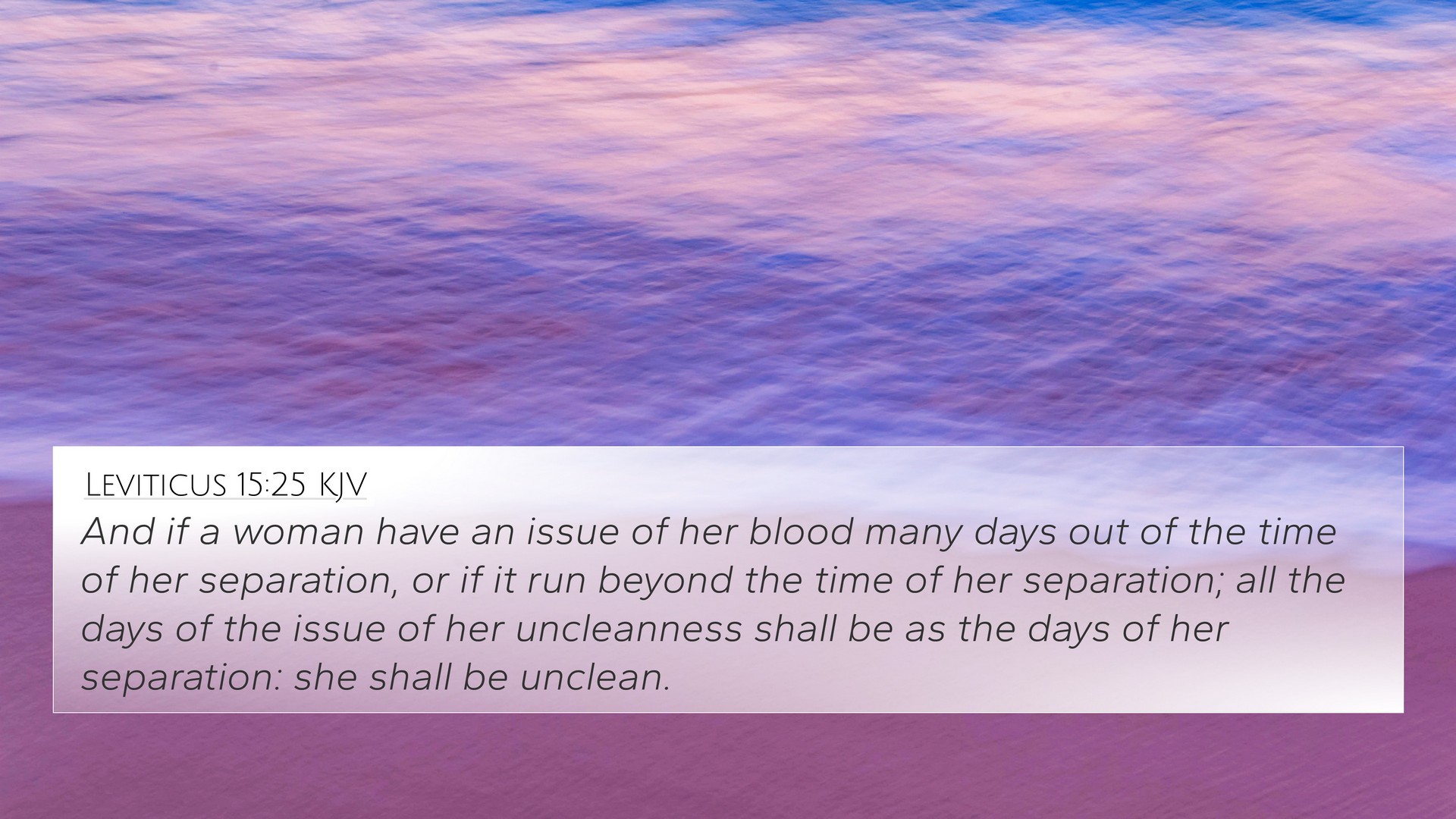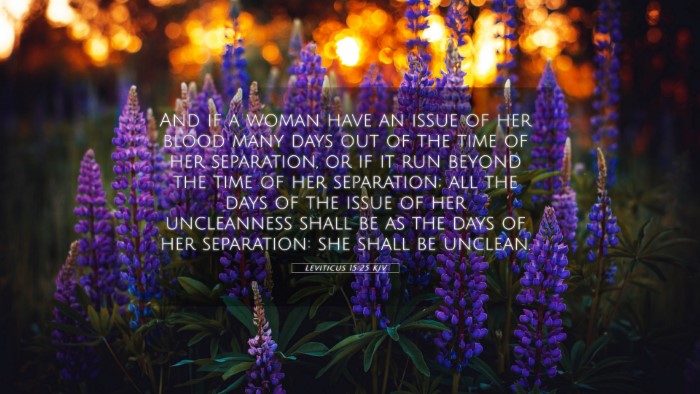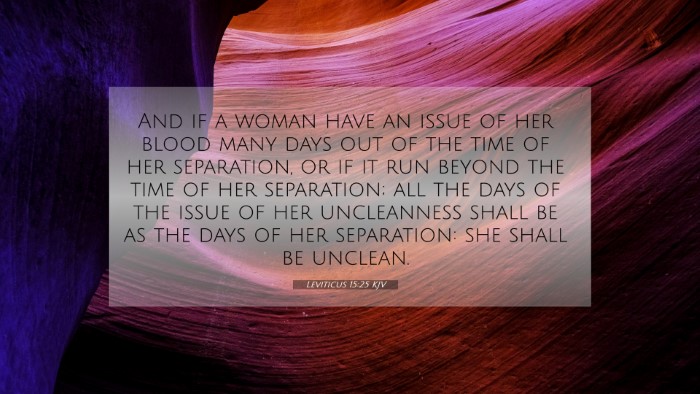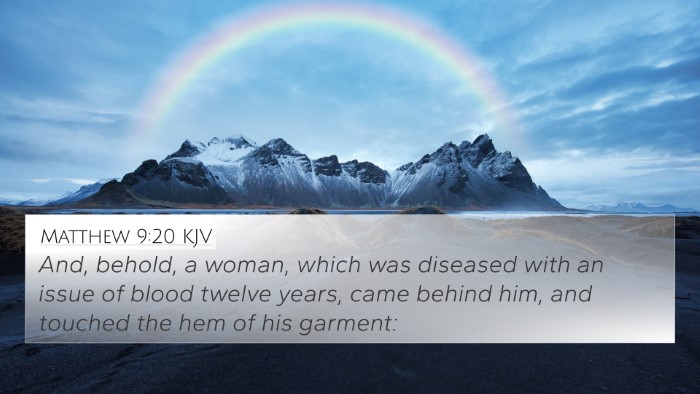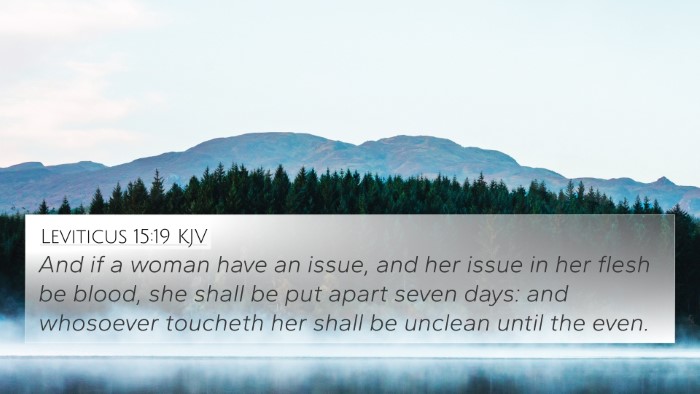Understanding Leviticus 15:25
Verse: Leviticus 15:25 (KJV) - "And if a woman have an issue of her blood many days out of the time of her separation, or if it run beyond the time of her separation; all the days of the issue of her uncleanness shall be as the days of her separation: she shall be unclean."
Summary of Key Themes
This verse addresses the ceremonial laws concerning menstrual impurity, which was significant in the ritual life of ancient Israel. In essence, it declares a woman to be ceremonially unclean for the duration of her menstrual bleeding, extending beyond the normal period due to complications.
Insights from Public Domain Commentaries
The following insights incorporate the teachings from Matthew Henry, Albert Barnes, and Adam Clarke:
- Matthew Henry: He emphasizes the importance of understanding the distinction between physical ailments and spiritual purity. The laws surrounding uncleanness were meant to highlight the separateness required when one was in a state of impurity. He also points out that these regulations served as a reminder of the consequences of sin.
- Albert Barnes: Barnes elaborates on the reasons behind such purity laws. He suggests that they were designed not only for health reasons but were also significant for socio-religious practice, reinforcing communal purity and worship readiness. He notes that this measure indicates a woman's physical state impacting communal worship and personal holiness.
- Adam Clarke: Clarke highlights the text's focus on identifying and responding to health conditions that carried ritual implications. He provides a historical context, explaining how these laws reflect the broader biblical principle of cleanliness and holiness, which is an enduring theme throughout Scripture.
Biblical Cross-References
Leviticus 15:25 connects with several other Bible verses, enhancing the understanding of purity laws and their implications:
- Leviticus 15:19: Discusses the laws regarding menstruation and the concept of uncleanness.
- Leviticus 12:2-5: Elaborates on childbirth laws and subsequent periods of purification.
- Numbers 19:15: Discusses the contamination of items due to contact with individuals deemed unclean.
- Hebrews 13:4: Mentions the sanctity of marriage and how God honors the marriage bed, implying the importance of purity.
- Matthew 9:20-22: Relates to the New Testament when a woman with an issue of blood touches Jesus and is healed, thus connecting the Old Testament understanding of uncleanness with the New Testament narrative of healing.
- Mark 5:25-34: Similar to Matthew’s account, it speaks about the woman with an issue of blood who finds healing in Christ, showing the shift from Old to New Covenant perspectives on purity.
- Luke 8:43-48: Also recounts the healing of the woman, illustrating the compassion of Jesus toward those who were marginalized under the law.
Connecting Themes
The thematic connections throughout the Bible related to Leviticus 15:25 often center around spiritual and physical purity, the role of women in biblical times, and the impact of sin on communal life. These themes open corridors for deeper interpretations and applications within both historical and contemporary contexts.
Tools for Bible Cross-Referencing
When studying verses like Leviticus 15:25, utilizing tools and resources can enhance understanding:
- Bible concordance: Aids in identifying specific words and their occurrences to draw thematic parallels.
- Bible cross-reference guide: Provides structured connections between related verses, facilitating comparative studies.
- Cross-reference Bible study: Techniques to integrate various scriptures into a cohesive thematic study, promoting a holistic grasp of biblical doctrines.
- Bible reference resources: Such tools include study Bibles and commentaries that offer additional insights on passages.
Conclusion
Leviticus 15:25 serves as a foundational verse that encapsulates the rich tradition of ritual purity laws in the Old Testament, setting the stage for understanding the transformative message of the New Testament regarding healing and grace. Engaging with cross-references not only deepens knowledge but also enriches the spiritual application of scripture in the life of believers.
